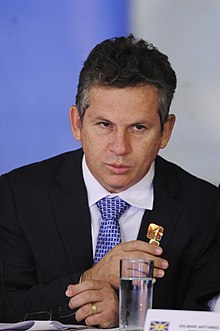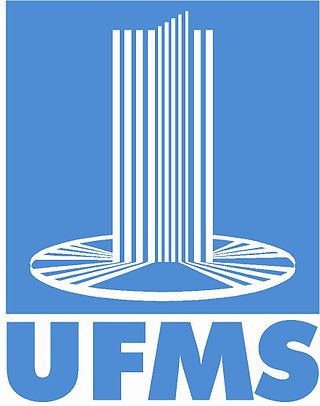| Mato Grosso | |
|---|---|
 Governor's flag of the State of Mato Grosso | |
 Flag of Mato Grosso | |
| Residence | Palácio Paiaguás |
| Precursor | Pedro Taques |
| Formation | 1889 |
| First holder | Antônio Maria Coelho |
Below is a list of governors of the Brazilian state of Mato Grosso.
| Order | Name | Term begins | Terms ends | Comments |
| 56th | Mauro Mendes | 2019 | Incumbent | Governor-elect in universal suffrage on October 7, 2018 |
| 55th | Pedro Taques | 2015 | 2018 | Governor elected by universal suffrage on October 5, 2014 |
| 54th | Silval da Cunha | 2010 | 2014 | Vice-governor-elect took over after the resignation of the incumbent Governor re-elected on October 3, 2010 |
| 53rd | Blairo Maggi | 2003 | 2010 | Governor elected by universal suffrage on October 6, 2002, Governor re-elected on October 1, 2006, and who resigned |
| 52nd | Rogério Salles | 2002 | 2002 | Vice-governor-elect took over after the resignation of the incumbent |
| 51st | Dante de Oliveira | 1995 | 2002 | Governor elected by universal suffrage on October 3, 1994, Governor reelected to universal suffrage on October 4, 1998, and who resigned |
| 50th | Jaime Campos | 1991 | 1994 | Governor elected by universal suffrage on October 3, 1990 |
| 49th | Edison de Oliveira | 1990 | 1991 | Vice-governor-elect took over after the resignation of the incumbent |
| 48th | Carlos Bezerra | 1987 | 1990 | Governor elected by universal suffrage on November 15, 1986, and who resigned |
| 47th | Wilmar Peres de Faria | 1986 | 1987 | Vice-governor-elect took over after the resignation of the incumbent |
| 46th | Júlio Campos | 1983 | 1986 | Governor elected by universal suffrage on November 15, 1982, and who resigned |
| 45th | Frederico Campos | 1979 | 1983 | Governor elected by the Legislative Assembly on September 1, 1978 |
| 44th | Cássio Leite de Barros | 1978 | 1979 | vice-governor-elect, took office the post of governor due to the resignation of the incumbent |
| 43rd | José Garcia Neto | 1975 | 1978 | Governor elected by the Legislative Assembly on October 3, 1974 |
| 42nd | José Fragelli | 1971 | 1975 | Governor elected by the Legislative Assembly on October 3, 1970 |
| 41st | Pedro Pedrossian | 1966 | 1971 | Governor-elect in universal suffrage on October 3, 1965 |
| 40th | Fernando Corrêa da Costa | 1961 | 1966 | Governor-elect in universal suffrage on October 3, 1960 |
| 39th | João Ponce de Arruda | 1956 | 1961 | Governor-elect in universal suffrage on October 3, 1955 |
| 38th | Fernando Corrêa da Costa | 1951 | 1956 | Governor-elect in universal suffrage on October 3, 1950 |
| 37th | Jari Gomes | 1950 | 1951 | Governor appointed |
| 36th | Arnaldo Estêvão de Figueiredo | 1947 | 1950 | Governor indirectly elected by the Legislative Assembly |
| 35th | José Marcelo Moreira | 1946 | 1947 | Governor appointed |
| 34th | Olegário de Barros | 1945 | 1946 | Governor appointed |
| 33rd | Júlio Strübing Müller | 1937 | 1945 | Federal interventor |
| 32nd | Manuel Ari da Silva Pires | 1937 | 1937 | Federal interventor |
| 31st | Mário Correia da Costa | 1935 | 1937 | Governor-elect and Interventor federal |
| 30th | Newton Deschamps Cavalcanti | 1935 | 1935 | Federal interventor |
| 29th | Fenelon Müller | 1935 | 1935 | Federal interventor |
| 28th | César de Mesquita Serva | 1934 | 1935 | Federal interventor |
| 27th | Leônidas Antero de Matos | 1932 | 1934 | Federal interventor |
| 26th | Artur Antunes Maciel | 1931 | 1932 | Federal interventor |
| 25th | Antonino Mena Gonçalves | 1930 | 1931 | Federal interventor |
| 24th | Sebastião Rabelo Leite | 1930 | 1930 | Federal interventor |
| 23rd | Aníbal Benício de Toledo | 1930 | 1930 | Quartermaster appointed by the federal government |
| 22nd | Mário Correia da Costa | 1926 | 1930 | President-elect in universal suffrage |
| 21st | Estêvão Alves Correia | 1924 | 1926 | President-elect in universal suffrage |
| 20th | Pedro Celestino Corrêa da Costa | 1922 | 1924 | President-elect in universal suffrage |
| 19th | Francisco de Aquino Correia | 1918 | 1922 | President-elect in universal suffrage |
| 18th | Cipriano da Costa Ferreira | 1917 | 1918 | President of the Legislative Assembly |
| 17th | Camilo Soares de Moura | 1917 | 1917 | Vice-president elected in office |
| 16th | Caetano Manuel de Faria e Albuquerque | 1915 | 1917 | President-elect in universal suffrage |
| 15th | Joaquim Augusto da Costa Marques | 1911 | 1915 | President-elect in universal suffrage |
| 14th | Pedro Celestino Corrêa da Costa | 1908 | 1911 | President of State appointed by the President of the Republic |
| 13th | Generoso Pais Leme de Sousa Ponce | 1907 | 1908 | President of the Legislative Assembly |
| 12th | Pedro Leite Osório | 1906 | 1907 | Vice-president elected in office |
| 11th | Antônio Pais de Barros | 1903 | 1906 | President-elect in universal suffrage |
| 10th | Antônio Pedro Alves de Barros | 1899 | 1903 | President-elect in universal suffrage |
| 9th | Antônio Leite de Figueiredo | 1899 | 1899 | President of State appointed by the President of the Republic |
| 8th | João Pedro Xavier Câmara | 1899 | 1899 | President appointed by predecessor |
| 7th | Antônio Cesário de Figueiredo | 1899 | 1898 | Governor appointed by President Prudente de Moraes |
| 6th | Antônio Correia da Costa | 1898 | 1899 | Governor appointed by President Prudente de Moraes |
| 5th | Manuel José Murtinho | 1895 | 1898 | Governor appointed by President Deodoro da Fonseca |
| 4th | João Nepomuceno de Medeiros Mallet | 1891 | 1891 | Governor appointed by President Deodoro da Fonseca |
| 3rd | José da Silva Rondon | 1891 | 1891 | Governor appointed by President Deodoro da Fonseca |
| 2nd | Frederico Solon de Sampaio Ribeiro | 1891 | 1891 | Governor appointed by President Deodoro da Fonseca |
| 1st | Antônio Maria Coelho | 1889 | 1891 | Governor appointed by President Deodoro da Fonseca |
















